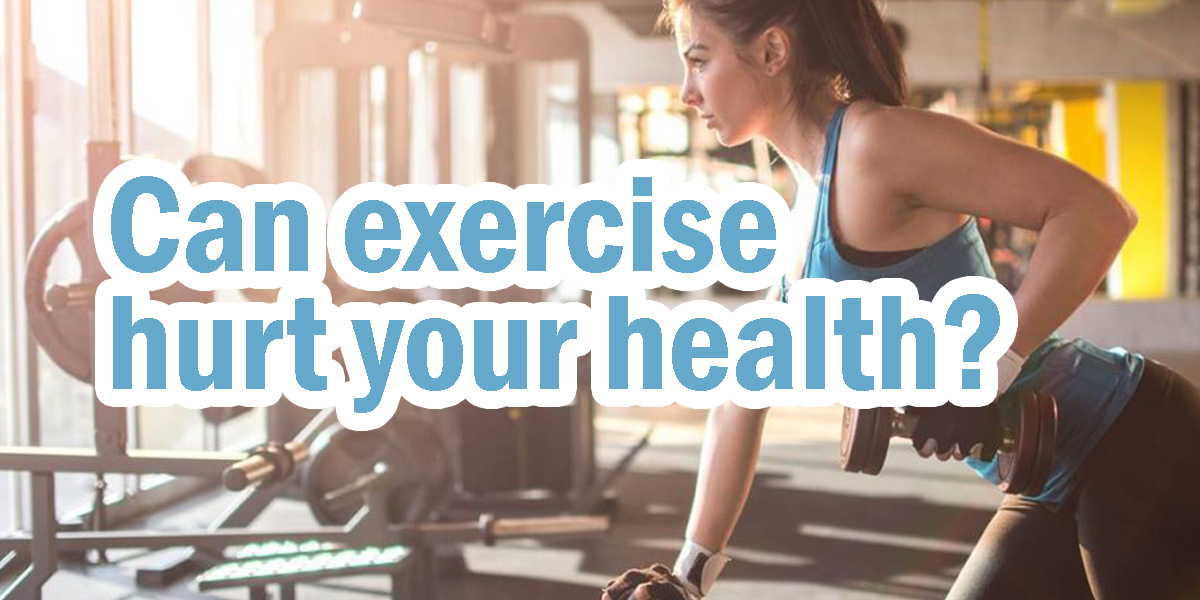No health tip is complete without emphasizing the importance of exercise. The web is filled with words that hail exercising. But there is very little that sheds light on the other side. So, in this blog, I bring the truth about Can exercise hurt your health?
Anything in excess is bad!
And exercise is no exception.
Exercise is a boon when done in the right way. But a few wrong moves can turn it into a bane.
The tipping point!
While most people suffer from a lack of exercise, there are a few addicted to exercising. They end up exercising too intensely and too frequently. There is a thing about exercising, there is a tipping point beyond which exercising can do more harm than good.
When you exercise past the tipping point, the body shows overtraining syndrome (OTS). Pushing harder and doing a bit extra exercise is fine. But when you go past the tipping point exercise loses its magic. Rather than feeling refreshed and energized, you start feeling fatigued. Your sleep pattern might change, appetite curbs.
Also Read: Can exercise alter your food choices?
High-intensity workouts
High-intensity exercises should not be done more than three times a week. However, depending on your body and your workout regime, your recovery period could be between three to seven days.
The soreness of muscles, wear, and tears need time to heal and recover. Soreness from intensive workouts needs twice the time to heal and recover than long and slow exercise.
‘One prime factor in obtaining optimal health is recovery.’
Whether it’s the overtraining syndrome (OTS) or delayed onset muscle soreness (DOMS), the body needs time to heal. An important equation to keep in mind is ‘when exercise intensity increases, the frequency of exercise should be diminished’.
Also Read: Exercise for good health
When to stop!
Your body will tell you when to stop, but you too shall see through the signs!
Overtraining leads to a decrement in fitness level and may cause possible injuries. So, recognizing the early signs of detrimental fitness can help in understanding the tipping point. Past the tipping point exercising doesn’t make you energized, it makes you feel fatigued. It messes up with your sleep system and curbs your appetite.
If you are aware of your body then you will notice the signs that exercise is hurting you!
Also Read: Exercise and Heart Health – The big debate
7 signs of over-exercising
One of the key things to remember in the route to fitness is recovery. If you don’t give your body that time to heal and recover then it sure will show some adverse effects.
Here are a few certain symptoms of over-exercising:
1. How are you doing?
An obvious sign of over-exercise is deterred performance. Feeling fatigued, losing strength and diminishing endurance can mean that you are overdoing it. Though a few hours of fatigue or ‘heavy legs’ are common, continued fatigue can mean ‘low availability of energy.’ This can result from excessive training and too little fuelling.
2. Sore body and sour mood
Body soreness is the first signal often followed by a drip in your happy hormones. Exercise affects your stress hormones, cortisol, and epinephrine. But when you overdo it, negative effects start to float. Resulting in mood swings, irritability, and loss of concentration.
3. Wide awake all night
Ideally, exercise balances your body and enhances your sleep experiences. But over-exhaustion can result in an overproduction of stress hormones. And the effect of stress on sleep is well-known.
4. No hunger only anger!
Research shows that exercise helps in developing healthy eating habits. But when the workout passes the tipping point, your hormones go haywire. And that messes up everything. Rather than feeling the natural urge to eat healthily, you start to lose appetite which further decreases your fuel levels making you cranky and sore.
5. Oops! that hurts.
Over-exercising can cause muscle soreness and joint pains. But most of the time, this pain subsides in a few days. But if the pain persists longer than two weeks than there can be a notable injury.
Overtraining taxes the entire body. It deters the immune system. Depletes energy levels. And results in sluggishness, pain, and sores.
6. What’s tripping?
Consistent low levels of energy can lead to nutrient deficiencies that lead to anemia and weakness. This causes dizziness, nausea, and fatigue. Long-term deficiencies can also affect the cardiovascular, gastrointestinal, endocrine, nervous, or reproductive systems.
7. Drowning in Depression
While exercise is a potent cure for depression, over-exercise can cause the same. Grueling competitions and punishing workouts can cause an imbalance of hormones, immobility, and inability to train. This affects mental health.
Also Read: Why you must do your warm-up exercises?
Can exercise hurt your health?
In conclusion, the answer to Can exercise hurt your health is ‘yes’, if you overdo it!
To get the best fitness results it is important to design a program that includes both activity and recovery. Though rest can be frustrating for the fitness addicts, it is very important if you want to get the best results.


3 comments
[…] Also Read: Can exercise hurt your health? […]
Really Appreciate this post, is there any way I can get an alert email whenever you publish a fresh update?
A fascinating discussion is worth comment. There’s no doubt that that you ought to publish more on this subject, it might not be a taboo subject but usually folks don’t speak about these issues. To the next! Kind regards!!